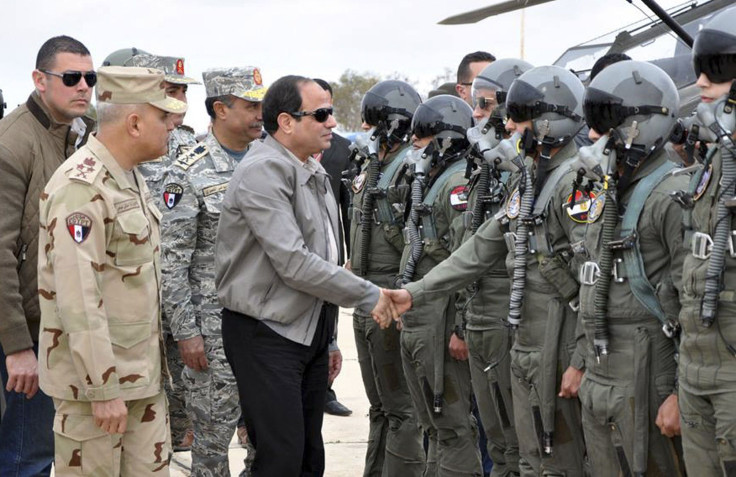Arab States Against ISIS: Divisions Between Egypt, Qatar, Syria Impede Islamic State Fight, Undermine Arab League

The diplomatic spat that emerged between Egypt and Qatar following this week's Arab League meeting is only the latest example of the political incoherence among Arab states confronted by the common threat of the Islamic State. While Arab governments have been united in condemning the extremist group, they differ on strategy, and their competing interests impede forming a unified front even in forums such as the Arab League, which appears increasingly irrelevant in the regional crisis.
On Friday, Egypt’s government attempted to address the fallout of its diplomatic flare-up with Qatar at the Arab League in Cairo, where this week Egypt pushed for regional support for its air campaign against ISIS targets in Libya. Egypt began its airstrikes in Libya Monday in retaliation for the beheading of 21 Egyptian Coptic Christians by ISIS militants there.
In response, Qatar’s representative at the Arab League expressed his government’s reservations about Egypt’s response to ISIS provocations and warned of the consequences of unilateral action. This brought swift condemnation from an Egyptian envoy, whose subsequent accusations that the Gulf state was effectively supporting terrorism prompted Qatar to recall its ambassador from Cairo, Reuters reported.
Tensions between the two countries have long simmered, but the public diplomatic tiff is just the latest manifestation of the many divisions among Arab states that have blocked a unified response to the threat. While certain coordinated efforts are under way in the fight against ISIS, a common position will not be forthcoming, said Dr. Lucia Volk, a professor of international relations at San Francisco State University in California.
Former Saudi intelligence chief Prince Turki al-Faisal underscored this point in an interview this week criticizing the impact of the U.S.-led coalition, which has been bombing the militant group in Iraq and Syria for six months. He said the airstrikes were too limited and not well coordinated, reserving additional criticism for Iraq’s government, which he said was not sharing intelligence on ISIS with Arab partners in the coalition, NPR reported. Though Riyadh has taken some tentative recent steps toward better relations with the Baghdad government of Prime Minister Haider al-Abadi, the Sunni Arab kingdom has long been suspicious of the country’s Shiite-dominated leadership, which has been criticized for disenfranchising Sunni Iraqis.
Despite Turki’s signaling of Saudi dissatisfaction with the effort, the kingdom, along with the United Arab Emirates, Jordan and Qatar, has remained a key member of the coalition that has been fighting the Islamic State since August, shortly after its rapid seizure of swathes of territory in Iraq and Syria. But even within the coalition, there has been some division on tactics, with the UAE suspending its participation in airstrikes following the kidnapping of Jordanian pilot Lt. Muath al-Kaseasbeh, who was later shown being burned alive in a gruesome ISIS video. The Gulf nation last week decided to rejoin the campaign after a meeting with U.S. Secretary of State John Kerry, VOA reported.
As unified as the rhetoric of Arab governments may be on ISIS, particularly after the shocking executions of al-Kaseasbeh and the Egyptian Christians, regional power dynamics and politics nonetheless weigh into considerations around the fight. “In Syria, the fight against ISIS strengthens the power of [Syrian President Bashar Assad], whom ... the Arab League have asked to resign,” said Volk, the San Francisco State University professor.
The 22-member league suspended Syria’s membership in 2011 and has allowed opposition groups to participate in certain meetings. Assad’s Iranian-backed government has long been opposed by many Arab states, including Saudi Arabia and Qatar, which are backing various rebel factions.
The Arab League’s failure to pressure Assad to concede to a political resolution is one of the bloc’s many failures in recent years as it has struggled to meet the rapid succession of challenges emerging from the 2011 Arab Spring. “The Arab League’s mandate -- to ‘draw closer the relations between member states and co-ordinate collaboration, to safeguard their independence and sovereignty’ -- should, in theory, position it to deal with the region’s challenges,” according to Michael Broning, in a commentary for Foreign Affairs. “But even in the heady days of 2011, the league never really lived up to its ambitions. Its few breakthroughs, including a fragile consensus over the Saudi-sponsored Arab Peace Initiative to bring an end to the Israeli-Palestinian conflict in 2002, have been the exception rather than the rule.”
This, Broning argued, stands in stark comparison to the African Union, which has been more willing to flex its muscles against member states in the form of sanctions and even armed interventions. The AU is currently confronting its own regional jihadist threat in the form of Nigerian's Boko Haram, which has increasingly expanded beyond its base in northeast Nigeria to neighboring Niger, Cameroon and Chad. The regional bloc authorized a 7,500-strong force of troops to respond to the threat last month.
In contrast, Egyptian President Abdel Fattah al-Sisi has made the Arab League an afterthought to his plan of calling for a United Nations resolution mandating an international coalition to intervene in Libya to stop ISIS there. Sisi’s move has further undermined the Arab League, according to an editorial in the leading Middle East daily Asharq Al-Awsat, which argued that Sisi lost a valuable opportunity to empower the organization. “Such a move would have been even more important than going to the U.N. Security Council; it would have helped usher in a new Arab moment, reining in and exposing all those who play dicey games with the region’s destiny in order to fulfill their own narrow interests.”
© Copyright IBTimes 2024. All rights reserved.






















